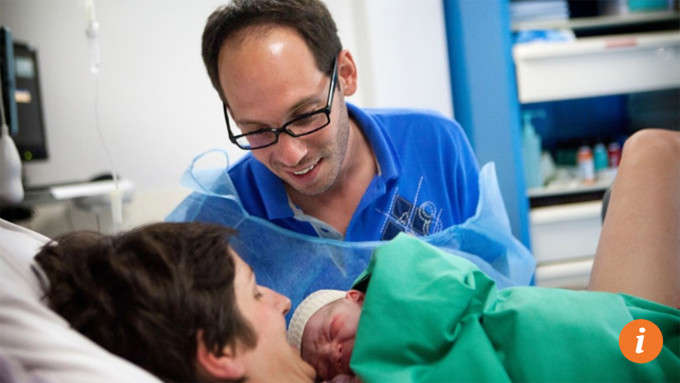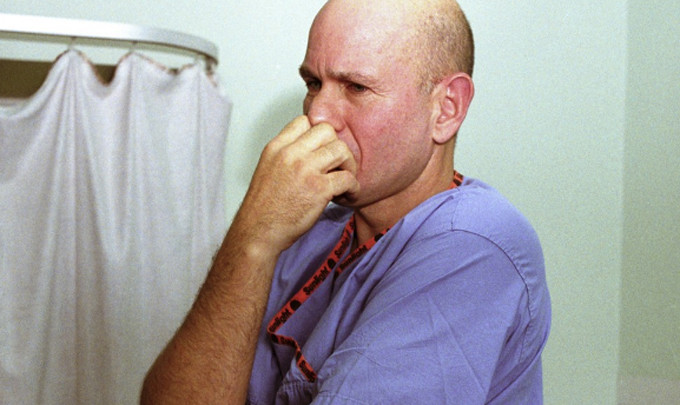Should the husband be allowed in the delivery room with his wife?
Witnessing a wife giving birth, for many people, improves their relationship, but for others it affects their sex life.
Many men say that witnessing their wife give birth is one of the most important events of their lives, but doctors say their presence does not always have a positive effect.
Some fathers decide to be in the delivery room with their wives because they feel they “should” be there rather than because they really want to be. They may not feel like it, but because of the feeling of “here is the person I love most in the world going through terrible pain and there is nothing I can do to make it easier for her” they are there.
In the UK, it is estimated that more than 90% of fathers attend the birth of their children. Most of them claim that it is the “most precious” experience of their lives, but are they telling the truth?
 |
More and more fathers are participating in the birth process with their wives. |
In 1960—when the rate was closer to 15 percent—a doctor in London interviewed fathers and their partners after birth. He asked them if they were happy witnesses. Without exception, they answered “Yes.”
Dr George Davidson then spoke to each man, assuring them that their answers were confidential. This time, most fathers said that although childbirth was a remarkable event, they could live without it. Many felt it had improved their relationship with their partner, but others admitted that the images of their partner giving birth were a hindrance to a healthy sex life.
Davidson’s findings were largely ignored, and fathers increasingly found themselves in the delivery room rather than standing in hospital hallways. But in the late 1990s, French gynecologist Michel Odent, a pioneer of the water birth movement, did something different by not being present at the birth.
After interviewing hundreds of couples, Odent suggests that the father’s presence is not always helpful during childbirth. A father, stressed by seeing his partner in pain, may try to comfort her by talking. However, the effort of conversation forces the woman to react, and that part of her brain is distracted from its primary task. In doing so, Odent argues, men interfere with childbirth, and may contribute to higher cesarean rates.
Liz Purnell-Webb, founder of Hong Kong-based pregnancy and birth resource A Mother's Touch, is "a big believer that babies should be born the way they were meant to be," providing them with a positive environment, "with love and affection." Purnell-Webb believes that babies benefit from hearing their parents' voices when they enter the world, and "if the mother has to have a caesarean section, the father is there to have skin-to-skin contact with the baby." "Father empowerment, intimacy with the partner, a stronger bond between parent and child" are all valuable reasons for a father to be present in the delivery room, according to Purnell-Webb.
However, she also agrees that many fathers feel overstressed and don't know what they can do to support their partners. "It's about giving dads the knowledge to support them during labor - during birth - when the baby is born." That knowledge will help dads overcome any fears they may have.
 |
Excessive stress in the father can become an obstacle during childbirth. |
Kathy Kitzis, who has lived in Hong Kong for 14 years and has been a midwife and teacher for the antenatal program Calmbirth for eight years, says: “I am a big advocate for having someone knowledgeable in the delivery room who brings positive energy.” And that could be the baby’s father, the mother, or a professional midwife.
Every woman is unique and has different situations, Kitzis adds: "There's no one-size-fits-all approach. I've been involved in many births where I do everything I can to encourage a mother, and they need to hear words of encouragement from their husbands too... I've also been in places where the husband really doesn't know how to help his wife and it becomes a hindrance."
Kitzis is a big advocate for both parents being involved before labor begins. "I believe that both parents should prepare for birth because they have different roles. It's important that they both understand the birth process."
She agrees that there is a lot of pressure on dads these days to be “the perfect birth partner”, but it can be overcome and not to worry that “it’s not in a man’s DNA to be a good birth partner”. Patience, support and a positive attitude from the father are key.
"I've seen such an amazing connection between parents during childbirth. I think it would be sad if fathers didn't get to witness the birth of their children. They have a new appreciation for their wives when they see what they've been through," Kitzis said.
David Vernon, an Australian author of the book Men at Birth, has mentioned the experiences of hundreds of fathers who witnessed their children being born with two opposing views. "When women give birth, the hormones oxytocin and endorphins increase in their bodies, and therefore their perception of pain is different from their partners. But for men, who have never heard of childbirth before, the noise of a woman giving birth seems like extreme pain and this makes them anxious or scared," the author wrote.
Numerous studies have examined the opinions of fathers. Some have corroborated Odent and Vernon’s findings: If men understand the pain of childbirth, their women will have shorter, less complicated births. But mothers should heed the results of other research: The presence of a father at birth does not correlate with greater involvement.
The bottom line of all this – there is no one right way to do it, only the right way for you. And a father's absence at the birth of his child does not make him any less responsible.
According to ngoisao.net
| RELATED NEWS |
|---|



-78a4d480fd5f97608a2d0056dc724582.jpg)




